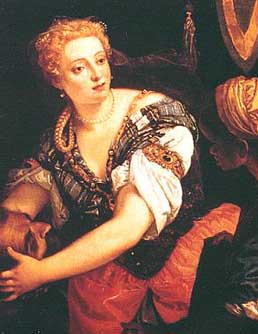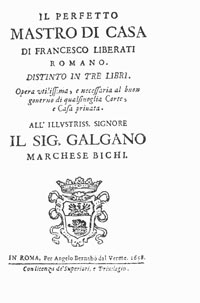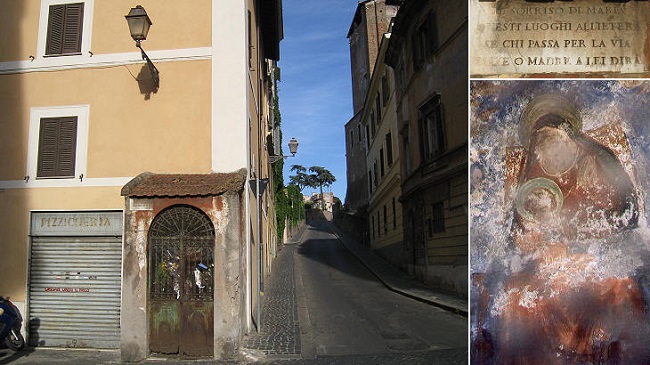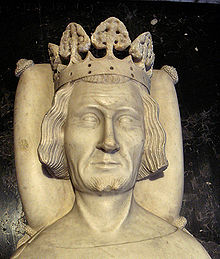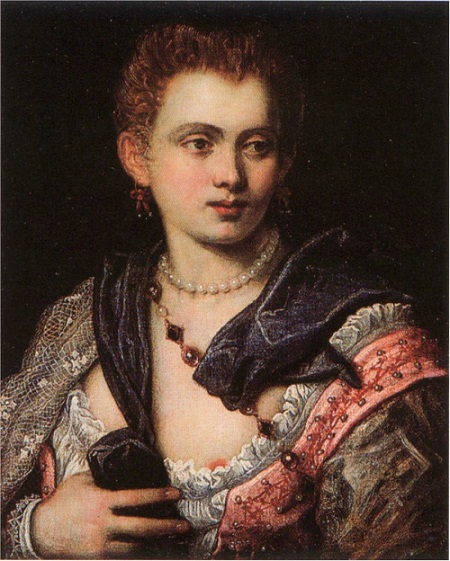
(Portrait by Tintoretto, c,1575)
Veronica Franco (1580-1625) was a poet famous in her own time who made her living as a courtesan. she received her training from her mother, who was also a courtesan until she married. The Franco family was of relatively high birth for Venice, coming from the cittadini class. However, the early death of her father left Veronica without the financial possibility to wed, although it is reported that in her teens she married a wealthy doctor, but the marriage ended badly. She turned to the advice of her mother and studied the humanities, as well as music, art, and dance, becoming an intellectual courtesan, or cortigiana onesta. The members of this group of “free women” earned their living by entertaining men of wealth and stature, especially the (married) Venetian patriciate. By the age of 20 she was listed in the Catalogo de tutte le principal et più honorate cortigiane di Venetia, which gave the names, addresses, and fees of Venice’s most prominent prostitutes; her mother was listed as the person to whom the fee should be paid.
Franco began her education at an early age. She studied the biographies of elite Venetian men whom she later lauded in commissioned sonnets. At elite social gatherings for men, she played the lute and the spinet, recited her poetry, and discussed Greek and Roman literature. She also kept abreast of works by contemporary artists, writers and politicians.
Franco was a prolific poet, publishing her own collection of verse (Terza rime) in 1575. In this volume, Franco included seventeen autobiographical poems regarding her life as a courtesan, a work that attempted to distinguish the courtesan from the illiterate women who sold sex. Other poetry, filled with dedications and accolades, described Veronica’s relationships with male patrons. Much of the poetry was erotic and designed to tantalize clients. Her explicit eroticism was a departure from Petrarchan love poetry, and established genre at this time. Aware of her feminine sexual powers, this honest courtesan used her poetry to undermine ideal templates of women as silent and unapproachable. Her bold sensuality earned the scorn of male writers such as Maffio Venier. Venier lambasted Franco will obscene verse, a challenge she accepted with relish, deftly neutralizing his attempts to publicly humiliate her. Besides herself, Franco defended all women who had been victimised physically and/or verbally by men.
In her fifty Lettere familiari a diversi (Family Letters to Different People), published in Venice in 1580, Franco exhibited a variety of skills. These writings contain biographical sketches of contemporary notables as well as snapshots of her daily life. She also commented on the events and situations represented in her capitoli. As a moralist Franco used her Letters as a vehicle to place her private life on the public stage and to testify to the fairness, virtue, reason, and wisdom of the courtesan.
In 1575, during the epidemic of plague that ravaged the city, Franco was forced to leave Venice and lost much of her wealth when her house and possessions were looted. She was brought before the Inquisition in 1580 on charges of placing men with whom she had relationships under her spell, a charge of witchcraft, but the charges were dropped as it is said that her connections with Venetian nobility were influential.. Prior to her death at the age of forty-five she helped found an asylum for wayward women, but it is said that after her appearance before the Inquisition she lost all material goods and wealth and died in relative poverty.
Franco’s life was recorded in the 1992 book The Honest Courtesan, by author Margaret Rosenthal and her life was made into a movie in 1998 called Dangerous Beauty.
